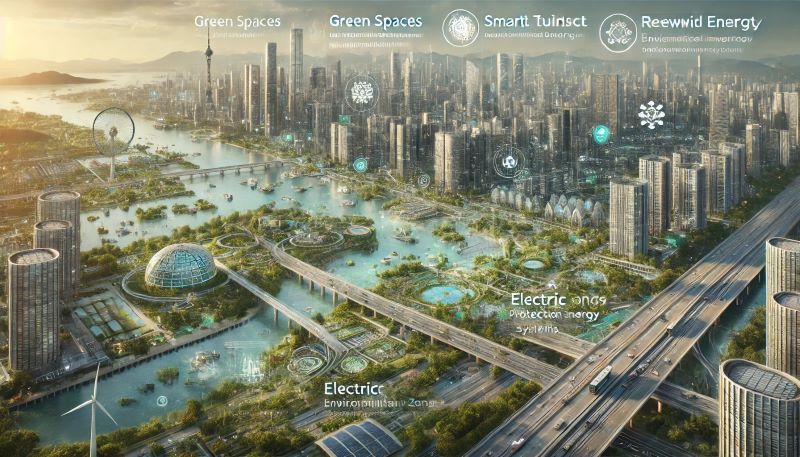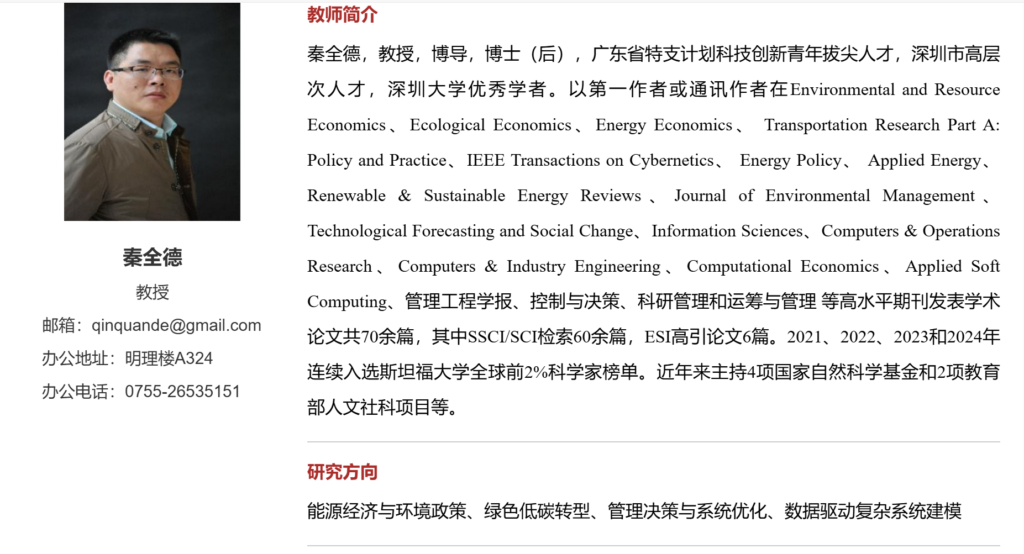

Project chief scientist: Prof. Quande QIN.
The accelerating impacts of climate change present unprecedented challenges to megagglomerations—urban regions comprising interconnected cities that drive global economic growth. These densely populated and economically vibrant regions face increased vulnerability to environmental risks, including extreme weather events, air pollution, and rising sea levels. To sustain their economic dynamism and ensure long-term resilience, there is an urgent need to develop climate adaptability policies that promote sustainable development. This research project focuses on three critical dimensions: environmental governance efficiency, urban finance policies, and ecological protection, with a special emphasis on the Guangdong-Hong Kong-Macau Greater Bay Area (GBA), one of the world’s leading megagglomerations.
1. Environmental Governance Efficiency: Environmental governance efficiency is crucial in managing the climate risks that threaten megagglomerations like the GBA. As one of China’s most economically advanced regions, the GBA faces significant environmental challenges, such as severe air pollution, water resource management issues, and coastal vulnerabilities due to sea level rise. Efficient governance frameworks are essential for coordinating efforts across the region’s multiple jurisdictions, including the cities of Hong Kong, Macau, Shenzhen, and Guangzhou. This research will investigate how the GBA can optimize environmental governance through data-driven approaches, such as the use of smart city technologies to monitor environmental conditions in real-time. By assessing the current governance structures, this study will explore how intercity collaboration can improve environmental policies, reduce carbon emissions, and increase resilience to climate-related risks across the region.
2. Urban Finance Policy in Climate Change: Urban finance policies play a pivotal role in implementing large-scale climate adaptation strategies, particularly in economically integrated regions like the GBA. As a major financial hub, the GBA has significant potential to mobilize financial resources through innovative mechanisms such as green bonds, climate funds, and public-private partnerships. This research will examine how the GBA’s financial institutions can leverage their global reach to support sustainable infrastructure projects, including flood defense systems, renewable energy grids, and green buildings. We will also analyze how regional financial frameworks can be adapted to incorporate climate risks into long-term investment strategies, ensuring that the GBA’s cities remain resilient in the face of growing environmental pressures. Furthermore, policies such as carbon pricing and eco-compensation schemes will be evaluated for their effectiveness in promoting climate-friendly development while maintaining the region’s economic competitiveness.
3. Ecological Protection Policy: The rapid urbanization of the GBA has placed immense pressure on its ecological systems, particularly its wetlands, coastal areas, and biodiversity. As urban sprawl threatens these ecosystems, protecting and restoring them becomes critical to the region’s climate resilience. This research will explore how the GBA can implement robust ecological protection policies that align with its urban expansion and industrial activities. Key areas of focus will include coastal wetland conservation, urban reforestation, and the development of nature-based solutions, such as mangrove rehabilitation and floodplain restoration, which serve as natural buffers against climate impacts. The study will also examine the role of cross-border cooperation in ecological governance, exploring how cities within the GBA can collaboratively manage shared environmental resources to enhance regional biodiversity and mitigate climate-related risks.
Focus on the Guangdong-Hong Kong-Macau Greater Bay Area (GBA): The GBA is one of the most dynamic megagglomerations globally, integrating economies from Hong Kong, Macau, and nine cities in Guangdong Province. However, the region faces significant environmental stress due to rapid urbanization and industrialization. This research will focus on how the GBA’s unique political and economic structure can be leveraged to address climate change. The GBA’s ambitious “Outline Development Plan” already highlights green development as a strategic priority, and this study will build on existing efforts by evaluating the effectiveness of ongoing environmental initiatives. By examining case studies from Shenzhen’s green finance innovation and Hong Kong’s ecological protection projects, the research will offer insights into how the GBA can balance environmental sustainability with its role as a global economic hub. Furthermore, the project will explore how coordinated governance across Hong Kong, Macau, and mainland cities can enhance the GBA’s overall climate resilience and contribute to China’s national goals for carbon neutrality.
Conclusion: This research project aims to provide comprehensive insights into how megagglomerations like the GBA can develop climate adaptability policies to ensure sustainable development. By focusing on environmental governance efficiency, innovative urban finance policies, and ecological protection measures, this study will offer actionable recommendations for policymakers and stakeholders in the GBA and other similar regions globally. Through a multidisciplinary approach that integrates environmental science, economics, and public policy, this research will contribute to the broader discourse on building climate-resilient urban environments.